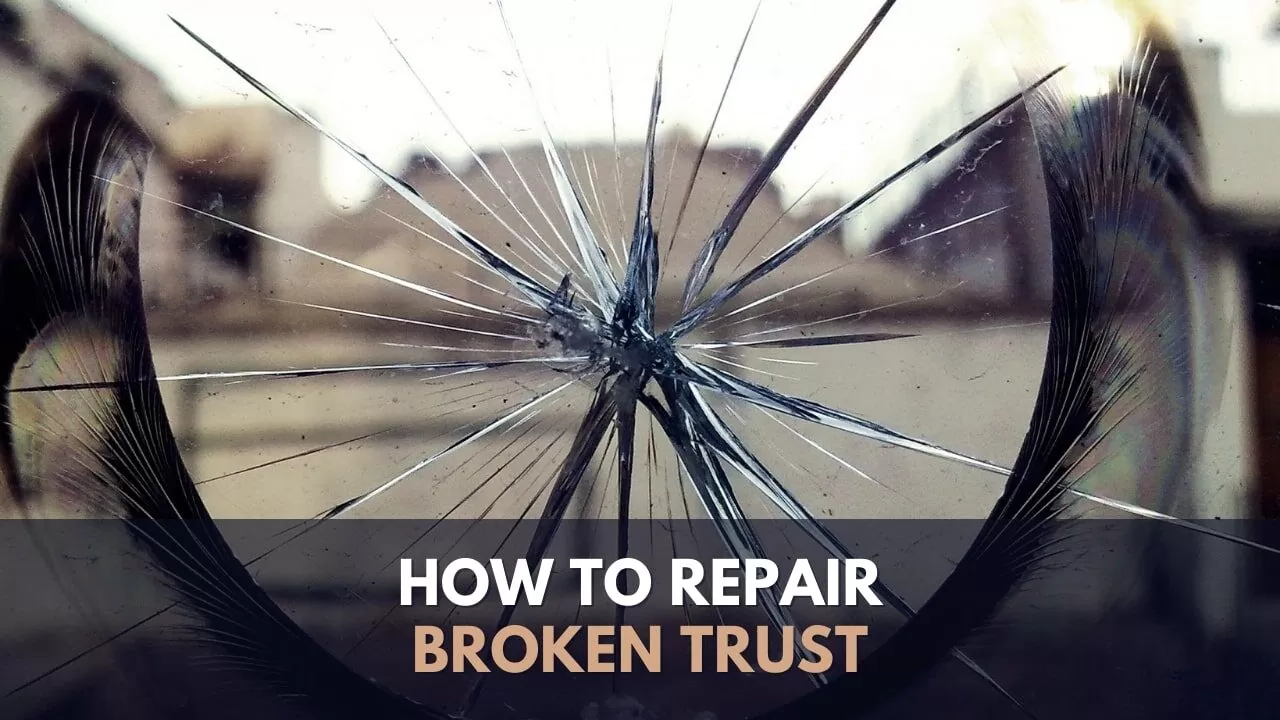Today's Thursday • 4 mins read
Trust is safety. We feel trust when we believe that someone or something will not hurt us.
Trust is a core component of any relationship. When trust is broken, the relationship begins to crumble unless both parties take immediate actions to repair it.
When trust is broken, it can be very difficult to repair.
Here is how to do it in quick, ethical ways.
How To Fix Broken Trust Quickly In A Relationship?
Three proactive ways to fix broken trust: 1. Acknowledging it and taking responsibility, 2. Rectifying behavior and actions, and 3. Future assurances of not betraying them again. The trust breaker must not blame the victim, hold secrets from them, or make future decisions without asking them.
Here are some helpful tips to fix broken trust in a relationship:
Apologize Sincerely.
Ask for forgiveness with simplicity and humility. And do it unconditionally.
Do not coerce your partner to forgive you because you pardoned them in the past. Do not suppose they have forgiven you because they no more bring up the issue.
To restore trust and rebuild the relationship, you must be willing to work at it with honest intention and a long commitment.
What to do when you are the one to break the trust? You can do a few right things while waiting for your victimized partner to reach a decision about the relationship.
Show Honesty.
Show behavior to prove you are honest about your dealings and events. Keep your partner updated about your engagements that do not involve them, at home and outside the home.
Since most of the onus of trust repair falls on the person who breaks it, the offender must be honest about their past intentions, present rectification, and future behavior.
Assume Responsibility.
Assume responsibility for your mistakes and stop blaming your partner or other people, or situations, for your act of betrayal. Do not indulge in victim-shaming and victim-blaming, even if you want out of the relationship.

How The Victim Can Respond To Broken Trust
When you lose trust in your relationship because of the other person, it takes a lot to bring it back. There are two problems: getting over your anger and believing you won’t do it again. The following tips would help:
Decide To Breakup.
Decide conclusively if you want to end the relationship, or if you want to rebuild the broken trust. If you would like to continue, then talk to them. Try to understand why they betrayed you and how did they reach that point. You might see the red flags you missed or your own missteps you overlooked.
Choose To Forgive.
Remember, forgiving does not mean you are condoning their act of infidelity. It also does not mean you forget what they did. Forgiving means you no more harbor any bitterness or anger against your partner. Release resentment and stop overthinking.
Rebuild Faith.
Remind yourself people can be trusted. Give it a second chance, if it works for you, with a mindset of resilience and growth. Take the betrayal as a temporary setback and decide to bounce back from it and re-grow your relationship. If they are trying to be good, notice and praise their efforts (this is positive reinforcement).
How A Couple Can Fix Broken Trust
Once you both agree to renew your fidelity vows and decide to restore the mutual trust, the following tips are extremely helpful:
- Re-analyze the experience with empathy.
- Be open to change. Grow and improve.
- Reveal your feelings and vulnerabilities.
- Discuss what both need from each other.
- Communicate freely and stay accessible.
- Make fresh commitments and new promises.
- Reignite the old passions and memories.
- Stabilize and then strengthen your bond.
- Plan future goals and dreams together.
- Get professional help from a counselor.
Final Words
The process of repairing a broken trust is not easy, and it takes time. No matter what the cause of the breakdown is, fixing broken trust takes a lot of patience, complete integrity, and continuous effort.
• • •
How To Stay Married To A Narcissist?